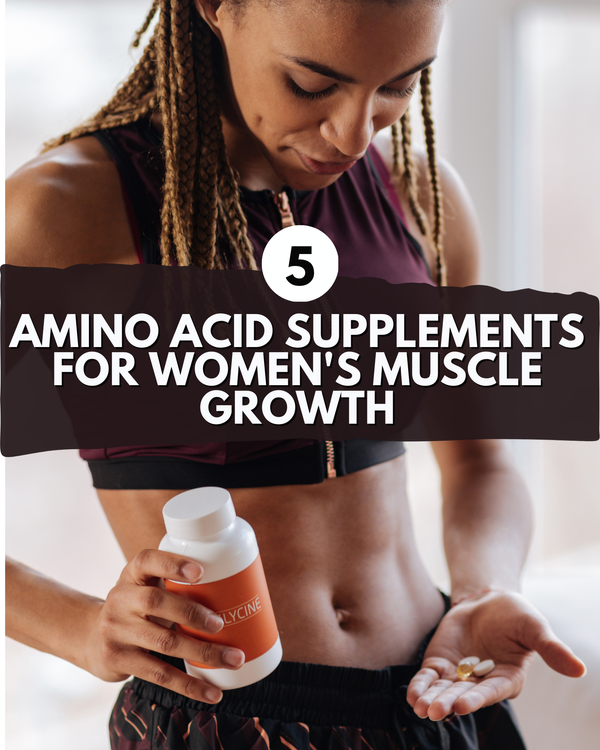We all know that our stomachs are home to a whole lot of little bugs that are essential to our overall health and happiness. So, what's the secret to keeping these guys happy? A healthy diet and lifestyle are key, but sometimes we need a little extra help. That's where supplements come in. I mean, who doesn't love a good boost? In this blog, we're dishing out the deets on the 5 best supplements for gut health. Get ready to give those microorganisms the love they deserve, honey!

Probiotics
If you're looking for a little extra help in keeping your bacterial balance in check (and who isn't?), it's time to start embracing the magic of probiotics. These live microorganisms might sound a little scary, but trust me - they're your new best friends. You can find them in all sorts of yummy foods like yogurt and fermented veggies, but if you're really serious about taking care of your gut, a supplement might be just the ticket. Just make sure you're going all-in with a diverse range of strains and a high CFU count, because half-assing it isn't going to cut it.

Prebiotics
If you're not feeding those gut bacteria of yours, you're not doing your digestion any favors. That's where prebiotics come in - those non-digestible fibers that give your gut bugs something to chow down on. And let me tell you, onions, garlic, and bananas are just the beginning. You can also grab yourself a prebiotic supplement with a mix of fibers like inulin and fructooligosaccharides (FOS), because who doesn't love a good fiber cocktail? So go ahead, get your gut in shape - and let those bacteria know who's boss!

Digestive Enzymes
Digestive enzymes are natural substances that help break down food in the digestive tract. They can be especially helpful for those with digestive issues such as bloating, gas, and indigestion. Look for digestive enzyme supplements that contain a mix of enzymes such as protease, amylase, and lipase.

Glutamine
his little amino acid is a superstar when it comes to gut health. It's like the superhero that comes in to save the day when your digestive tract is feeling beat up and worn down. Glutamine helps repair and regenerate the lining of your gut, which can get damaged from all sorts of things like inflammation and stress. But you gotta be smart about it, girl. Don't just go grabbing any old glutamine supplement off the shelf. You want the good stuff - high-quality and free from any additives or fillers. Trust me, your gut will thank you later.

Omega-3 Fatty Acids
Omega-3 fatty acids are essential fats that can help reduce inflammation in the gut. They are found in fatty fish such as salmon and mackerel, but can also be taken as supplements. Look for a high-quality omega-3 supplement that contains both EPA and DHA.
FAQ's
What are supplements for gut health?
Supplements for gut health are products designed to promote digestive health by improving the balance of bacteria in the gut. They can come in the form of probiotics, prebiotics, digestive enzymes, fiber supplements, and more.
What are probiotics and how do they help with gut health?
Probiotics are live bacteria and yeasts that are beneficial for the digestive system. They work by restoring the natural balance of bacteria in the gut, improving digestion, and supporting overall gut health. They can be found in fermented foods like yogurt, kefir, and sauerkraut, as well as in supplement form.
What are prebiotics and how do they help with gut health?
Prebiotics are types of dietary fiber that feed the beneficial bacteria in the gut. They help promote the growth of beneficial bacteria and improve overall gut health. They can be found in foods like onions, garlic, bananas, and artichokes, as well as in supplement form.
What are digestive enzymes and how do they help with gut health?
Digestive enzymes are proteins that help break down food into smaller molecules so that they can be easily absorbed by the body. They can help improve digestion, reduce bloating and gas, and support overall gut health. They can be found in foods like pineapple, papaya, and ginger, as well as in supplement form.
Are there any risks or side effects associated with taking supplements for gut health?
While supplements for gut health are generally safe, there may be some risks or side effects associated with taking them, particularly if taken in excess. Some people may experience digestive discomfort, bloating, or gas. It is important to speak with a healthcare professional before starting any new supplement regimen.
How do I choose the right supplement for my gut health?
Choosing the right supplement for your gut health depends on your specific needs and health goals. It is important to do your research, read product labels, and speak with a healthcare professional to determine which supplement is right for you.
Best Life At Large Conclusion
When it comes to gut health, there are a variety of supplements that can help promote a healthy digestive system. Probiotics are one of the most popular supplements, as they contain live bacteria that can improve gut flora and digestion. Prebiotics are another great option, as they feed the good bacteria already living in your gut. Digestive enzymes can also help break down food and aid in digestion, while glutamine can reduce inflammation in the gut. Finally, omega-3 fatty acids can promote gut health by reducing inflammation and improving overall gut function. However, it's important to do your research and choose high-quality supplements from reputable brands to ensure you're getting the most benefits. Always consult with your healthcare provider before starting any new supplements.











Member discussion